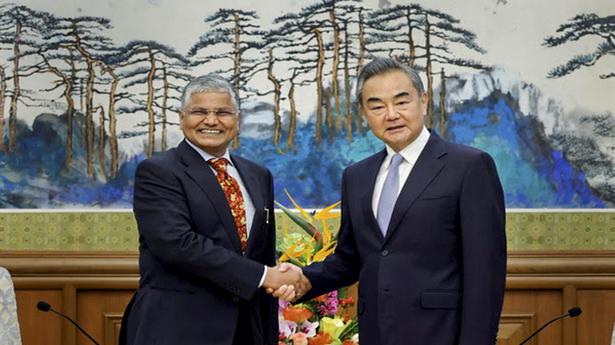
Ahead of BRICS meet, China’s Foreign Minister meets Indian envoy
The Hindu
Wang Yi highlights External Affairs Minister Jaishankar’s “disapproval” of European criticism on Ukraine
China’s Foreign Minister Wang Yi on Wednesday held talks with India’s envoy in Beijing, Pradeep Kumar Rawat, with both sides exchanging views on the boundary situation as well as broader bilateral ties.
The meeting, which was Mr. Rawat’s first with the Chinese Foreign Minister since his arrival in Beijing in March, came ahead of Thursday’s BRICS leaders’ summit. Mr. Wang pointedly referred to External Affairs Minister S. Jaishankar’s remarks earlier this month, during a security conference in Slovakia, that “Europe has to grow out of the mindset that Europe’s problems are the world’s problems but the world’s problems are not Europe’s problems.”
Mr. Jaishankar also said India was “perfectly capable of managing” the border situation with China and rejected Western attempts to draw a connection between Russia’s invasion of Ukraine, which India has been urged to condemn, and the Line of Actual Control (LAC) crisis with China.
Mr. Wang said, “Recently, External Affairs Minister Subrahmanyam Jaishankar publicly expressed his disapproval of European centralism and objections to external forces meddling in China-India relations. That reflects India's tradition of independence.”
He added that “common interests between China and India far outweigh the differences” and called on both sides to “work in the same direction to maintain the warming momentum in China-India relations and bring them back to the track of stable and sound development at an early date.”
Both sides, however, framed the border situation differently. Mr. Rawat, the Indian Embassy in Beijing said, “emphasised the criticality of maintenance of peace and tranquility in the border areas for realising the full potential” of relations.
Outlining a “four pronged perseverance”, Mr. Wang called on both sides to “persevere in putting the boundary issue in an appropriate place in bilateral relations” as well as “persevere in the important strategic consensus reached by the leaders of the two countries that China and India are partners rather than rivals…..persevere in continuously injecting positive energy into bilateral relations….. [and] persevere in expanding multilateral cooperation, joining hands to revitalize Oriental civilizations [and] coping with the complicated world together.”













